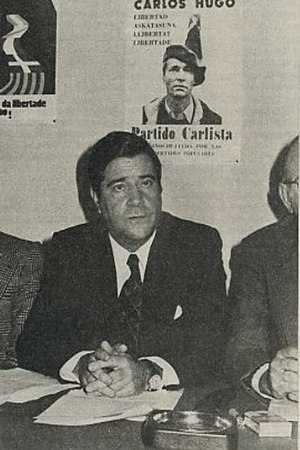Carlist Party (1970)
Carlist Party Partido Carlista | |
|---|---|
| Political position | Left-wing |
| National affiliation | United Left (1986–1987) |
| Colours | Coral |
| Party flag | |
 | |
| Website | |
| partidocarlista | |
The Carlist Party (Spanish: Partido Carlista, Catalan: Partit Carlí, Basque: Karlista Alderdia, Galician: Partido Carlista, Asturian: Partíu Carlista; PC) is a Spanish political party that considers itself as a successor to the historical tradition of Carlism. The party was founded in 1970, although it remained illegal until 1977 following the death of the caudillo Francisco Franco and the democratisation of Spain.
Since 2000, the general secretary of the party has been Evaristo Olcina and its official publication since is El Federal. It has a political line of the alternative
The Carlist Party was also known for supporting Carlos Hugo, Duke of Parma over his brother for leading the Carlist movement.
History
The current organisation of the Carlist Party originates from the renovation of the ideology of the illegal Traditionalist Communion, which it was conceived during the 1950s and 1960s in a situation of illegality and prohibition imposed in Francoist Spain to university and workers organisations of non-integrated Carlism (Group of Traditionalist Students, AET, the university; Traditionalist Worker's Movement, MOT, the workers) into the Francoist only official party, with the support of prince Carlos Hugo, Duke of Parma, even though the name of the Carlist Party did not materialize until the end of the 1960s.
Between 1970 and 1972, the Carlist Party organised Congresses of the Carlist People in Arbonne, in which it adopted a program for the ideological change of Carlism towards self-management socialism and the conversion of Carlist Party into a federal and democratic party of the masses and of class which aspired to a socialist-based monarchy in a pact between the dynasty and the people. The leader Francesc Xavier after suffering a serious automobile accident conceded full powers to his son Carlos Hugo, represented in Spain for José María de Zavala, to run the party and resigned on 20 April 1975.
According to party data, it contained around 25,000 members in 1977. In 1974, the Carlist Party went on to form an alliance jointly with other forces of the opposition from the Democratic Junta of Spain until it ended in February 1975 to go on to form part of the Democratic Convergence Platform which fused with the Democratic Junta in the Democratic Co-ordination in March 1976.
It was not able to participate in the first
After supporting the
Mariano Zufia, general secretary of the Carlist Party of Euskal Herria and Navarrese member of parliament, assumed the post of General Secretary of the Carlist Party. In 1986, he was one of the forces that gave origin to United Left, even though he walked out of the coalition in 1987. The Carlist Party missed attending the majority of later electoral processes due to funds and militancy failures. In 1989, it was one of the political parties and signing associations of the Pact of Estella; in 2005, the party campaigned against the European Constitution.
The Carlist Party has continued to oppose both main political parties in Spain, the People's Party and the Spanish Socialist Workers' Party.[1]
Ideology
The Carlist Party's ideology is motivated by
The Carlist Party supports democracy and socialism, seeing them as a bulwark against both fascism and liberalism (with which it identifies capitalism) respectively.[3] It supports a number of social justice causes, such as the legalization of homosexuality[4] and ethnic minority rights,[5] but justifying these things from a Catholic, rather than liberal, perspective.[6]
Federated parties
- Carlist Party of Euskal Herria
- Carlist Party of Aragon
- Carlist Party of Catalonia
- Carlist Party of the Kingdom of León
- Carlist Party of Asturias
- Carlist Party of the Valencian Country
- Carlist Party of Murcia
References
- ^ "Presentacion" (in Spanish).
- ^ "Quiénes somos". Carlismo Partido Carlista (in Spanish). Retrieved 2023-05-15.
- ^ partidocarlista (2022-05-05). "Carlismo - Carlista - Carlistas - Partido Carlista". Carlismo Partido Carlista (in Spanish). Retrieved 2023-05-15.
- ^ partidocarlista (2021-06-25). "Partido Carlista, LGTBI". Carlismo Partido Carlista (in Spanish). Retrieved 2023-05-15.
- ^ "Quiénes somos". Carlismo Partido Carlista (in Spanish). Retrieved 2023-05-15.
- ^ partidocarlista (2023-04-02). "Carlismo - Carlista - Carlistas - Partido Carlista". Carlismo Partido Carlista (in Spanish). Retrieved 2023-05-15.


